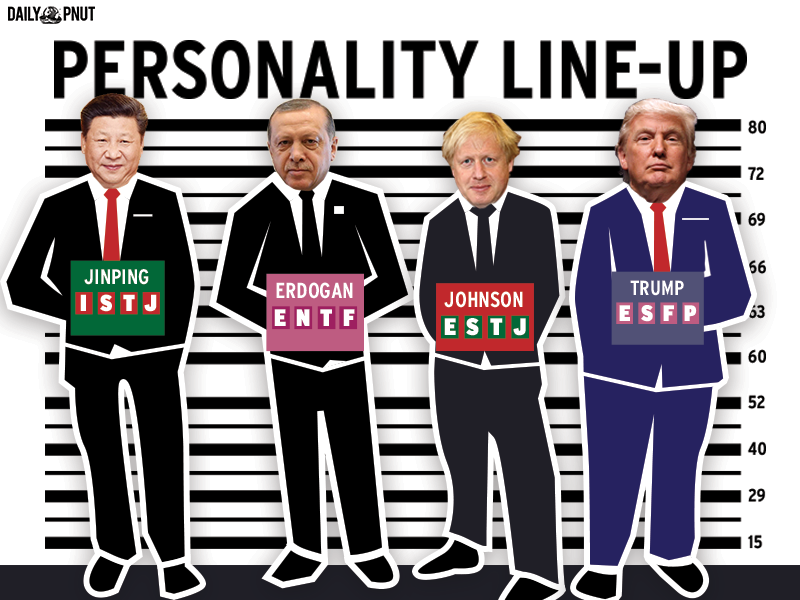Leadership DNA
August 13, 2019

“Not all readers become leaders, but all leaders must be readers.” – Harry Truman
“In every community there is a class of people profoundly dangerous to the rest. I don’t mean the criminals. For them we have punitive sanctions. I mean the leaders. Invariably the most dangerous people seek the power.” – Saul Bellow

Superego Or Super-Ego?
The 2020 presidential election is still 15 months away; campaigning, however, is in full swing. When deciding among various candidates, it should be remembered that popularity doesn’t automatically equate with good leadership; campaigning is not the same as governing. The personality traits that get someone elected may not be the ones that suit the role to which they were elected. Just as a leopard never changes its spots, a politician won’t change his or her innate character once in the White House. So how do personality traits like intellectual curiosity, integrity or narcissism affect a leader’s governance?
Past belief was that the character of our political leaders determined the character of our democracy; a fall from grace could end a candidacy or career. Donald Trump changed the criteria for electability and even office-holding. Scandals did not impede him; he captured the presidency via a scorched earth populist campaign that recognized no limits and took no prisoners. He defeated his rivals by mocking them, belittling them and, whenever possible, lying about them. He has governed the same way, remaining consistent in what he has always been: showman, chauvinist, charlatan. Rather than accepting the limits of what the office allows, Trump pushes the boundaries of what a president can do.
The paradox of populist leaders is that they promise to empower the people, but end up accumulating more and more power in their own hands. They undermine the authority of the democratic offices they hold, while simultaneously exaggerating that authority. When it comes to ethics, decorum, precedent, or rules of law, Trump either circumvents them, or simply ignores them. It remains to be seen whether he will ever be held politically accountable.

YouTube’s Algorightism
- YouTube has become the social media platform of the far right in Brazil. New research shows the platform’s search and recommendation system is designed, among other things, to maximize watch time, often playing videos automatically. It also systematically diverts users to increasingly provocative extremist and conspiracy channels they might otherwise not find.
- Members of the newly empowered far right — from grass roots organizers to federal lawmakers to President Jair Bolsonaro himself — say their movement would not have risen so far so fast without YouTube’s recommendation engine.
- The conspiracy theories being spread are not limited to politics. People searching for health care information found videos claiming the Zika virus was being spread by vaccines and insecticides, ultimately creating a public health crisis as frightened patients refused vaccines and even anti-Zika insecticides. (NYT)
- YouTube’s Susan Wojcicki: ‘Where’s the line of free speech – are you removing voices that should be heard?’ As the crisis-hit video site struggles to stem the flow of extreme content, the CEO talks about her role as the internet’s gatekeeper (The Guardian)
Yes, It Is That Easy
- Following the March 15 killing of 51 people in two mosques in Christchurch, New Zealand by an Australian white supremacist, the government passed legislation to ban most military-style semi-automatic weapons and components that modify existing weapons.
- Lawmakers then set aside 150 million New Zealand dollars to buy back firearms that were now illegal. Since starting the program in mid-July, 10,242 firearms have been handed into police, with an additional 1,269 firearms handed in under amnesty, meaning no questions will be asked by police about how or when owners without paperwork or a license acquired the weapons.
- The country is estimated to have a total of 1.2 to 1.5 million firearms. Owners of the now-illegal weapons have until December 20 to turn them in or face a prison term of two to five years. (Guardian)
- The world wonders what’s happened to America (CNN)
- Joe Biden: Banning Assault Weapons Works: That’s why, as president, I will push to ban them again. (NYT, $)
Breaking The Ice With A Few Questions
- The first ever national survey in Greenland examines the human impact of the climate emergency. More than 90 percent of islanders interviewed fully accept that the climate crisis is happening. 76 percent claim to have personally experienced global heating in their daily lives, from coping with dangerous sea ice journeys to having sled dogs euthanized for economic reasons tied to shorter winters.
- The survey’s lead author said: “The Arctic is a bellwether for the unequal impact of global warming on social and economic systems. As countries struggle to limit future risks and overall warming to 1.5C [an increase of 2.7F], many Arctic and Greenlandic residents are already living in regional climates that have changed by more than this, in less than a lifetime.” (Guardian)
- Plant-based diet can fight climate change – UN (BBC)
- Farmers Don’t Need to Read the Science. We Are Living It: A new report is another dire warning on climate change. (NYT, $)
- Swedes are switching from planes to trains — here’s why “Flight should be seen as a precious gift, to be used wisely and sparingly, not blown on cheap weekend jaunts,” a climate academic told NBC News. (CNBC)
- Ditch your air conditioning. You’ll be fine A hot room won’t usually kill you, but a hot planet will. If you feel sweaty, just imagine how your grandchildren are going to feel (The Guardian)
- In the future, only the rich will be able to escape the unbearable heat from climate change. In Iraq, it’s already happening: Baghdad offers a troubling glimpse into a future where only the wealthy are equipped to escape the effects of climate change (The Independent)
- Trump officials weaken protections for animals near extinction: Changes to how Endangered Species Act is implemented come as world scientists warn biodiversity crisis will put humanity at risk (Guardian)

Mining The New Silicon Valley
- Wyoming is determined to get off the fossil fuel grid. A wide-ranging package of new laws passed by the legislature last year aims to wean the state off its heavy reliance on the oil, gas and coal industries, and stem the flow of young people leaving for better jobs.
- Having been swayed by the notion that a rural economic revival can be built on coding skills, Wyoming’s 48 school districts will have until the 2022-2023 school year to begin teaching computer science at every grade level. (NYT)
- And if they get really good at CS, then: Top secret teens: The high schoolers recruited by the National Security Agency Alex Marquardt profile (CNN)
- ‘Coal is over’: the miners rooting for the Green New Deal: Appalachia’s main industry is dying and some workers are looking to a new economic promise after Trump’s proves empty (Guardian)
Additional USA News
- A U.S.-China Currency War? What You Need To Know (NPR)
- A Professor Tried to End a Sit-In With Bolt Cutters. Now He’s Been Fired. (NYT, $)
- Keep calling him #MoscowMitch: McConnell is finally running scared: Are Trump and his traitorous enablers modern-day McCarthyists? (Salon) And The Inside Story of How Newt Gingrich Single-Handedly Destroyed Congress: He went after three Democratic speakers. Two of them with absolutely vile lies. One resigned. The other lost re-election. And the House of Representatives was changed forever. (The Daily Beast)
- Surrogate Angels of Death: What to make of the First Lady holding the motherless child and youngest survivor of the El Paso massacre. (The Cut)
- The brand label that stokes Trump’s fury: ‘Racist, racist, racist.’ (WaPo, $)
- How white supremacy went mainstream in the US: 8chan, Trump, voter suppression: The same anxiety that drives white supremacists has motivated Republicans to disenfranchise populations that don’t vote for them (Guardian) And White Supremacy Has Never Been Fringe (NPR)

Survival Of The Most Adaptable
- Rapid technological change means workers must keep learning, to the point where an ability to adapt — your adaptability quotient (AQ)— is becoming the X-factor for career success. Amy Edmondson from Harvard Business School says whether you “lead a global corporation, advise clients, practice medicine, build homes or work in one of today’s state-of-the-art factories … you are a knowledge worker.”
- As such, you must collaborate with others to solve problems and “accomplish work that’s perpetually changing.” And the good news is scientists agree that AQ is not fixed — it can be developed. (BBC)
- What to Do When You Feel Uninspired at Work: It happens to us all, but it’s not the end of the world. (NYT, $)
LAST SONG
